If you understand the line, "Posers get lost," then no further explanation is necessary. Wendy O. Williams and the Plasmatics, the band of changing musicians created around the singer by radical anti-artist Rod Swenson, decided that merely singing against the status quo wasn't good enough. They backed up the music with deeds: demolishing cars, smashing TV sets, chain sawing guitars, and stepping over the edge at any given chance. Other acts may have attempted to come close, but Williams, during her evolving career as "Queen of Punk," "Queen of Shock Rock," and "High Priestess of Metal," pushed it harder than anyone. She proved to be one of the most authentic performers in rock history.
The Plasmatics exploded out of the New York City scene, and by 1979 it was one of the biggest drawing bands at CBGB. After numerous EPs, the debut album, "New Hope for the Wretched" was released in 1980 -- Williams followed it up with several studio releases during the 80's as part of the Plasmatics and as a solo act. But while the records were classics, the live performances were revolutionary. The controlled chaos of a Wendy O. Williams show distanced itself from the rest and not unexpectedly incurred the wrath of the mainstream establishment.
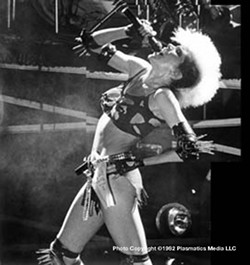
It was pushback from the mainstream -- along with not wanting to compromise her beliefs about art -- that caused Williams to retire from music in 1988. She moved to Connecticut with Swenson, her long-time companion, and became a state-licensed animal rehabilitator. Williams' death in 1998 caused shock waves and sadness among her friends and fans. It is undeniable that Williams challenged the establishment in ways that have not been seen before or since. And the influence can still be felt today.
Wendy O. Williams will be inducted into the Rochester Music Hall of Fame on Sunday, April 24, with a tribute performance led by Plasmatics guitarist Wes Beech and Cheri Currie, former lead singer of The Runaways.
Beech and Plasmatics drummer TC Tolliver will also do an in-store record signing on Saturday, April 23, at the Record Archive, from noon to 1 p.m. For more info, go to recordarchive.com.
City reached out to Beech at his home near Detroit, and talked with Rod Swenson, who is currently in Arizona. Swenson is a CESPA Fellow at the University of Connecticut. Both agreed to rare and candid interviews, and the extensive conversation with Swenson was spread over two sessions. An edited transcript of those interviews follows.
City: What was the best thing about being a member of the Plasmatics?
Wes Beech: Probably the camaraderie of being in the band, and the group dynamics. We were trailblazers. I don't think there was anybody with a strong female voice like Wendy fronting a band at that time. We went against the grain of everything that was out there. She was out to shake up the status quo and we were right there with her.
When the band started to destroy cars onstage, what were you thinking at the time?
The first time we did it nobody had done anything like that before, and we really didn't know what was going to happen. That was at the Palladium in New York. I was a little apprehensive, but I wasn't really worried. We had rehearsed some of the explosions, and even though it looked like it was out of control, it was more or less controlled.
That explosion was so loud, I couldn't hear the rest of the band for a couple of seconds. I was playing along and hoping that once my hearing came back we would still be together. We did one show at the University of Florida, and I got too close to the car as it was ready to explode and Wendy had to grab me and pull me away from the car right as it exploded.
How many cars did the Plasmatics demolish?
Quite a few. There was one tour were we blew up a car at every show. We played in a place in Detroit called the Masonic Temple Theatre, and that was the last rock show they had for a while. With the car explosion and the crowd going into frenzy, they didn't have rock shows for many years. When we went to England, we were going to blow up a car at the Hammersmith Odeon. The Greater London Council was trying to clamp down on punk rock bands, and they told us that we couldn't blow up the car. They canceled the show at the last minute, and it was a sold out show. We blew up cars all across the country and never had any problems.
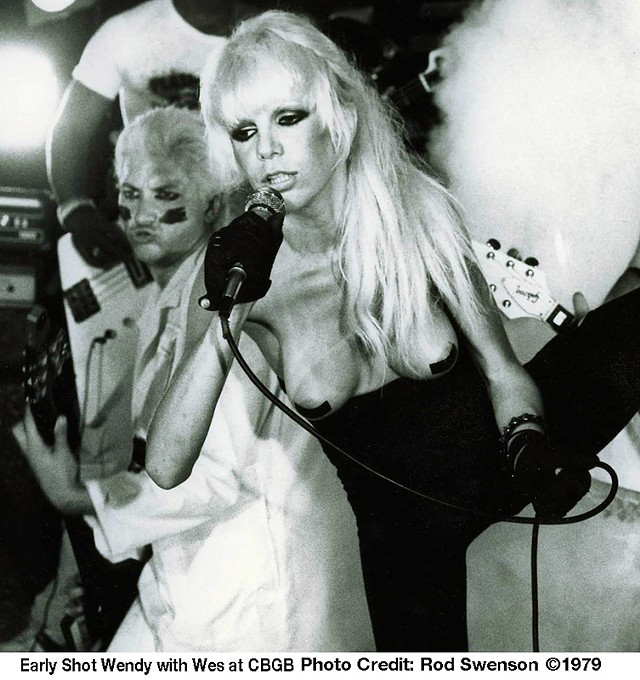
As a member of a shock rock band, did you ever feel like you were personally hassled by any authorities?
We had a great rapport with New York police and they would come to all our shows. Once we got out into the heartland, we had a lot of trouble there. Of course, Wendy was beat up in Milwaukee in a very ugly incident, and Rod Swenson, our manager, was also beat up. These were times before cell phones, before MTV, so when we came through town it was very shocking.
I don't think we ever thought of ourselves as a shock rock band, that was something the media put on us, we always thought of ourselves as just a rock band.
Despite the destruction of objects on stage, the band didn't incite violence, and the concerts were fairly peaceful, right?
Right. It was a cathartic release for the audience as well as the band. They came to see us and all their tensions and frustrations were let out with all the energy that we were putting forth from the stage.
The only riot we ever had was in Switzerland. There had been some unrest with the youth. They were frustrated with the local government, and they came to the show and totally went into frenzy and threw bottles at us. We had to leave the stage and sneak out a side door.
The Plasmatics went from punk to punk-metal; do you have any favorite albums or songs from that era?
We started out with three chords and then we became more proficient on our instruments. To me, the "Coup d'Etat" album was really powerful. That was where we made the transition to more of a metal sound. Dieter Dierks was the producer. He put us through a musical boot camp where we really worked hard at crafting the songs and getting the performances tight. For me, that was probably my favorite album. I also started playing more lead parts and had more of a songwriting presence on that album.
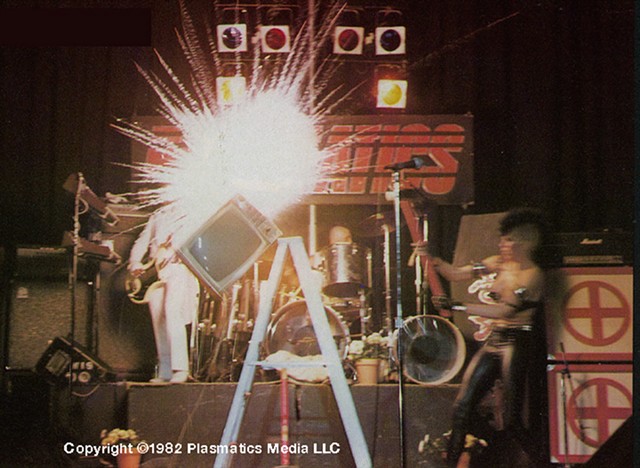
What was it like working with Wendy?
It was great. She was totally committed to her craft. People don't realize how hard she worked. She would work out, run six miles a day, and push the band to get the most out of us. We would rehearse every other day. We'd run through our whole set like it was an actual show at the same level and the same intensity. When we got through the set, we would be sweating and tired and panting, and she would look at us and go, "OK guys, let's do it again." That was the enthusiasm she had for it.
She seemed to really appreciate her fans.
She definitely did. There was a connection between the band and our fans. We did it for the fans. All of the money we were making we were putting back into the show, into the production costs. It's not inexpensive blowing up cars, chain sawing guitars at every show, and blowing up TVs.
Were you surprised at how Wendy ended her life?
Yeah, but it wasn't a total shock. She had apparently attempted to take her life on more than one occasion, and because she was in such good shape she didn't succeed. A day doesn't go by that I don't think about her and wonder what she would think about the state of music.
How do you think Wendy would react to being inducted into the Rochester Music Hall of Fame?
I think she would be honored to be recognized for her accomplishments by a mainstream establishment, but she would definitely try to shake them up and give them hell.
Do the Plasmatics belong in the Rock and Roll Hall of Fame?
I'm sure they do. Will they ever get there? Probably not. It's such a political thing, and I don't know if that would ever happen. In music history, the Plasmatics seem to get short shrift, and you don't hear much mention about Wendy, so it's really nice to see her get some recognition and acclaim for her accomplishments.
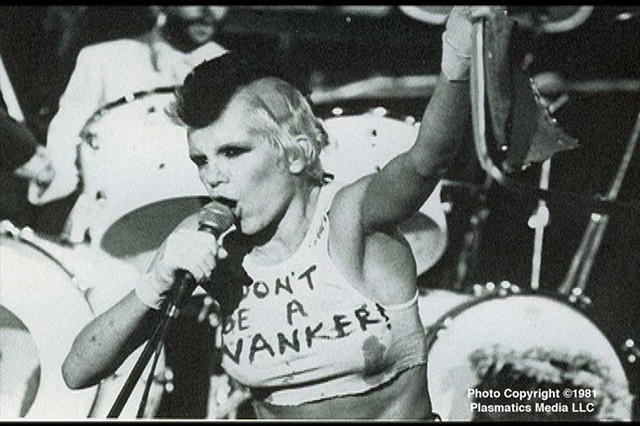
The following day, City spoke with Plasmatics founder Rod Swenson, who was also Williams' companion.
City: You once said, "The measure of true or high art is how confrontational it is." Can you elaborate on that?
Rod Swenson: At the time, what I meant was that the extent to which art confronts the status quo or conventional ways of seeing and thinking, that's a measure of how important it is. Things that pass as art are often times just imitative or redundant, so they are measured in some sense by how well they imitate some already existing ideal or model.
But this kind of thing to me has always been extremely boring and generally meaningless, so in music, pop music would be an example by definition of that -- not very high art, by our point of view. In the history of modern art, whenever something really creative came along and challenged the status quo, there was initially a great reaction to it; in fact, usually there was an attempt to suppress it. So great art in this view revolutionizes the way people see and think about things.
Describe your roles as both the Plasmatics creator and manager?
The creation of the band came at a point where after moving to Neo Dadaist conceptual art and then into experimental theater, I became involved with the underground rock scene in New York. Rock and roll to me was then the most legitimate form of contemporary art, and places like CBGB looked to me like ideal experimental laboratories to spawn potentially culturally shattering things.
I did a lot of video there at the time -- I shot The Ramones, Blondie, The Dead Boys. I think I was the first one to put Patti Smith on a larger stage outside of CBGB. Wendy came into my life pretty much just at this time. And creating a radical challenge to the conformity of the status quo -- a band that Dante Bonutto of Kerrang! once said was designed as a "battering ram against the establishment from day one" -- became the compelling thing for me to do. Something way beyond anything anyone had seen before, but with Wendy as the focal point.
Wendy was pure performer, and I thrived on taking on the status quo or the conformist crap we both saw around us. She had been traveling the world doing all kinds of experimental things, looking for something that she had yet to find. But when she and I met, she always said she found what she had always been looking for. I created and named and built the Plasmatics around her.
The albums read, "Concept and management: Rod Swenson," but most people know I also wrote the lyrics to the songs, did the staging, shot the album covers and videos -- sometimes under pseudonyms. As a manager though I did the things that managers usually do, such as negotiate deals and so on.
What first drew you to Wendy?
Actually she was originally drawn to me. I had an experimental theater, and I ran an ad looking for additional performers. She arrived at the Port Authority on a bus, and just arrived with a suitcase and no money, not enough to stay barely a night. She said later that she somehow felt, "I've got to go to New York now," and she found my ad on the floor of the Port Authority. Someone had tossed it on the ground; she picked it up -- it was open to the page -- called up, and came down for an audition. And there's more to it than that.
Anyway, from the first time we met, I think we both knew there was big chemistry for something that was going to happen that was unavoidable. She scared a lot of people, but what scared them was just what made her so exceptional to me. It's really something you can't put into words. She was just very authentic and just really one-of-a-kind. I think we both knew this about each other; there was something that was going to happen there.
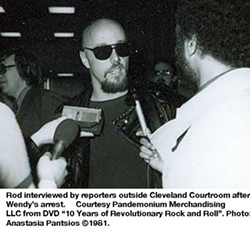
Can you describe your relationship with her?
We were significant others to each other beginning four or five months after she first walked into my office, and that's what we were to each other for the next 20 years. That's the short of it.
Where did this idea of destroying iconic things like cars, and chain sawing guitars, and smashing TVs come from?
In general, we smashed symbols of American mass culture, consumerism, and conformity, and those were the things we were out to assault with our art. Typically we did the TV smashing during the song "Living Dead," where part of the lyric is, "You sold your life in the discount store / You watch TV you don't want anymore / You got ideas in your head / They won't happen you're the living dead," and the chorus, "Oh I tried to warn you." That went on and Wendy would pull out a sledgehammer, and the crew would put a working TV on the stage, and she'd smash it.
Barely a year after we started, we were drawing huge crowds in New York. We were, I think, the biggest drawing band in the city. We were then playing four nights, two shows a night, at CBGB, and we were looking for somewhere much larger to play. All of a sudden thinking about the stage and the space that was on it, I thought this stage is big enough to blow up a car and it would have to be a Cadillac. An insane idea by ordinary thinking, but to us, in the mode that we were in, we saw it as an act of sanity in an insane world.
It was an opportunity to do something that had never been done before.
Yep, and we were fortunate enough to be able to sell Ron Delsener, the promoter, on it. I actually just sat down very straight faced and said that this is what we plan to do. He was fine to do it; we did a lot of stuff already at CBGB, and so on, without major incidents. So we developed a thing where people trusted us to that degree.
Were there any concerns about safety during the shows or the video shoots?
Yes, there really were -- of course, on our part and on other people's part. First, during a live show our goal was to put the audience's heart in their mouths, as Wendy used to sometimes say. I remember one critic wrote in a review that he was actually afraid he might die during the Palladium performance, and I think he was quite sincere. But of course, we didn't want to maim the audience or hurt anybody, and it was very tricky to design it so that wouldn't happen.
It took a lot of work and a lot of experiments that we did off-site to get the explosives to work right. We tethered the doors to wires so they would just blow to the edge of the stage and not into the audience. Things that Wendy did like smash out the windshield before we put the explosive in were done also to keep the glass from flying. If you didn't do it right, or if somebody was in the wrong place at the wrong time, you could have gotten killed. It's fair to say that nobody else has ever dared to do it and I don't think you'll ever see anything like that on stage again live.
On the videos, the concern was obviously for Wendy's safety because she did all of her own stunts, and many of them she certainly could have gotten killed doing. It took a huge amount of courage on her part and she loved to do those things. Her line was "Posers get lost," and one of the things she wanted to do was shatter the image of the rock performer as poser. And so she stepped out over the line in ways you'll never see any rock performer do again, and I don't think anybody's matched it since.
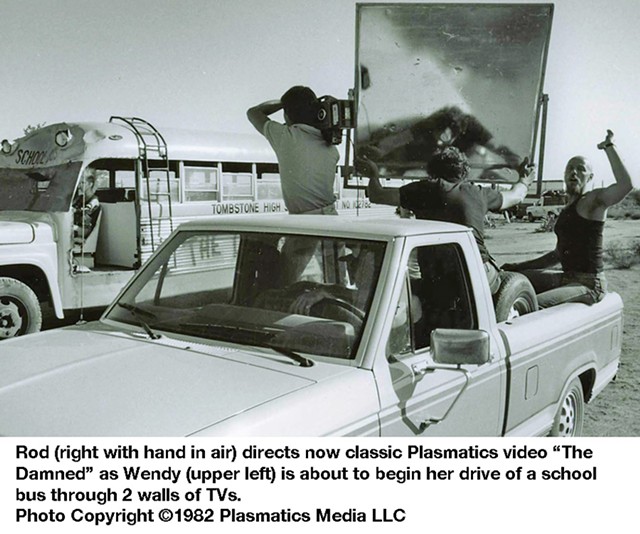
Both you and Wendy were severely beaten by police in Milwaukee, would you care to talk about that?
First I should say that we're not against police. We had lots of help in many places from police. But there are rogues in any line of work, and here we have the old-fashioned, kind of fascist, rogue police department. In this case, the vice squad decided they were going to put a stop to this very threatening woman and the radicals coming into their town. This was really a sexist thing, I think. We were on the "Fridays" show about a week before, and they just said this isn't going to happen in our town and we're going to put a stop to it.
A lot of that has been described in detail elsewhere, so I won't go into the whole thing. Short as possible, they arrested Wendy after a show and took her outside. And having her go through a gauntlet where they tried to keep away any witnesses, they made sexist remarks to her. They eventually threw her on the ground and started as a group beating her and kicking her. One of our roadies raced inside and got me where I was settling up with the promoter and told me what happened.
I raced through the door, through a bunch of police, and I saw her on the ground getting her face kicked -- kind of hideous. It was about the most shocking and awful thing I had ever seen in my life at that point. I just raced to her defense. I think I stopped them from wailing on her. I don't know what would have happened, but they grabbed me and dragged me behind a car and beat me unconscious with a nightstick. We both ended up in the hospital, and then they put us in jail and charged us with attacking them.

We were facing fairly serious charges and actually could have gone to jail. It ended up going to trial, and one thing it also did was to bleed us financially. The cost of the legal fees and everything was insane. We were able to stage several big benefit shows mostly in New York -- the Bonds shows as they were called -- and we were able to raise money to help us with it, but it was huge. Fortunately for us there were witnesses who described what really had happened, and of course, we ended up not being convicted; we ended up being victorious. But the cost is something that we had big problems recovering from for the next year or more.
The other thing it did: it was part of a cracking down on us by the establishment, because many promoters then wouldn't book us after the publicity. Even though we won, there was pressure on them from communities, and they were afraid of what might happen. At that point on as we were touring, we had other arrests and we had other places where clubs were shut down by the towns. We were way out over the edge and there was a huge sexist element to it. In other words, these guys who were very ... they didn't like to see a woman who was that strong and out in public acting that way. And of course, that was just the point.
Did Wendy ever talk to you about her childhood?
Yes, in great detail. Way too much to cover here, but all of it is framed in a fairly concise narrative. By her account, her childhood, and especially adolescence, was really difficult for her. She felt differently than the way people around her seemed to want her to be, and she grew up feeling frustrated, thwarted, and often times coerced and punished for trying to be who she was. She was an original, and she paid a price for it growing up.
As a teen she became increasingly rebellious and got into all kinds of trouble. Despite all kinds of measures to keep her under control, including the attempt to medicate her and even institutionalize her at one point, by her account. She refused to submit, and finally at not too old an age, could take no more and left home. Putting it as simply as possible, she took off into a world on her own pretty much with no money, no contacts, in search of what she later would call authenticity.
She told me this, in her account, probably in the first night that we spent together and it also appears in interviews somewhere where she basically said, this is a rough quote, "I'd rather be dead," -- she repeated many times -- "than be brainwashed into the complacent robot everybody wanted me to be."
Wendy seemed to be fearless. What are some things people might not know about her?
She was astoundingly fearless. That is when it came to taking on the establishment and the stereotypes about the way women could sing or look. We came into a situation where women were expected or were told to sing pretty or be cute or smile, but certainly don't be angry, don't sing tough, don't sing hard. They were expected to do what Wendy used to call "apple pie," which she always said made her gag.
She was absolutely fearless when it came to stuff like that, and that partly came from how she came out of her childhood and what she was determined to do or be. But she was truly fearful, on the other hand. What made her depressed was the kind of blind conformity -- what we used to call "consensus programming" -- that we attacked in our songs.
I'm not sure if people realize how palpable that fear or concern was to her. Maybe if they understand the passion of her music and her performing, they would. It was that which drove her on. What I found from almost the first time that I met her, in almost a true heroic sense, "I'm going in there to try and conquer this thing or fight it regardless."
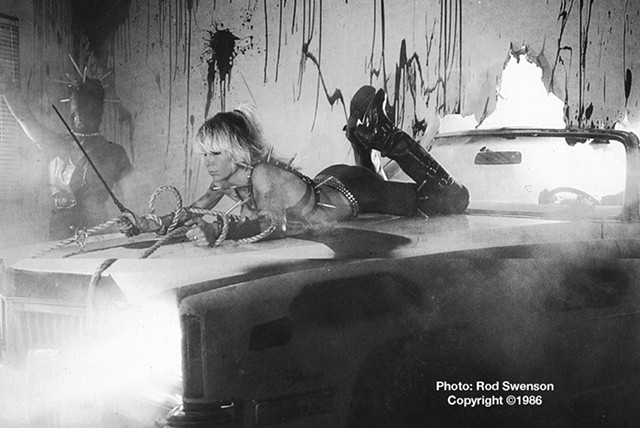
Do you feel you achieved what you set out to achieve with the Plasmatics?
Yes and no. Clearly with all the barriers broken down and all the benchmarks hit, it was very successful. Wendy went from being an unknown person into being, for some period of time, a national icon and newsmaker. She was in people's living rooms, and she changed fashion and music and so on. Successful? Yes in that way, for sure.
On the other hand, both of us were really hopeful revolutionaries. In a sense that we really thought we could change, in a deep structural way, the course of culture; get things off of what we thought was the disastrous course they were on. In this larger sense, it can't be said that we succeeded. The world today, instead of being turned around, is headed at increasing speed toward many of the things -- if not all the things -- we warned about. So much that we warned about has come true.
But in other words, it's not clear that it's been turned around at all, although the future has still to be written. And the fan base, people who are discovering the band now for the first time after all these years, has actually taken quite a surge in the last several years. We're able to see that. So who knows what's happening; who knows where it will go? Those of us that are around still are going to keep hoping.
Why did Wendy decide to retire from music?
When Wendy and I first agreed to jump into this thing -- when I proposed it, and she said with great excitement, yes she would do it -- she was the person who needed to understand that since we were out to turn the status quo upside down, we're going to get pushback. In other words the further we got into mass culture, the greater the threat to the status quo would be perceived, and the more serious the defensive push back was likely to be.
So when Wendy and the band went live on the "Fridays" show, she went into the living rooms of millions of people across the country. This led directly to the Milwaukee incident that happened only four or five days later. The Milwaukee thing led to an arrest a few nights later in Cleveland, although thankfully nobody was beaten up. Each of these things led to further publicity -- more police standing outside our shows, sometimes on the stage threatening arrest, and also reactionary citizens groups trying to get us banned from playing in their town.
These things continued to take their toll and continued all the way through into the "Maggots" album -- escalating with each tour. On the "Maggots" tour, for example, we had police burst into our hotel room at three in the morning to arrest Wendy for some odd thing that somebody claimed. Usually we beat these things, but the legal costs became huge and it became harder and harder to keep the thing afloat. At the same time, promoters had pressure on them not to promote the shows. They would say, "We love Wendy, but we can't do it, we can't risk it, we can't afford to do it," although the music was getting better, the recognition and the achievement levels were increasing.
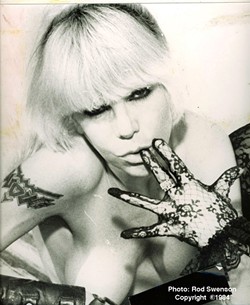
We kept getting into a point of diminishing returns because we had whole areas of the country we couldn't play. And so this got to be a point of where we would have had to make a lot of compromises, including things like Wendy was always under pressure from record companies to, "Will you just give us some radio friendly song, sing something a little more poppy or smoother or something," and she refused to do it. That wasn't her, that wasn't what she wanted to do. We didn't want to make money and fund ourselves in that way.
We made a pact when we started that everything has a life and there's a place where you realize that you've hit your peak in some sense, and rather than go downhill, we just agreed that we weren't going to do that. If it ever came to a point like that we'd stop.
And so coming somewhere out of the "Maggots" tour, that's when we looked at everything and we realized that's where we were. We had to say that we're really pleased and amazed with how far we got, but the screws are on us. And so we stopped, we didn't say we were stopping at that time. We said we were going on hiatus, but the two of us knew we were pretty much done. It was really not wanting to compromise in a sense, that's what it boils down to.
What was the impetus of her love of animals and her advocacy for them?
I think that it was because she always had great sympathy for the underdog. She kind of felt like that herself when she grew up, and animals she saw as innocent. And as far as the mess humans have placed the planet in, they were the victims. Whether it was factory farming or pointless testing of vanity products on animals, or animals in need of rehabilitation after some injury or mishap with a human, she just felt compelled to help.
She was a person with deep empathy, and of course, she became a rehabilitator after her retirement. During her career she spoke out against factory farming and chemical experimentation on animals for cosmetics. She was against the whole cosmetic industry and that kind of thing -- obviously was not a meat eater as well as being a teetotaler. She was on the cover of Kerrang! and at that same month she was on the cover of Vegetarian Times. I always thought that was kind of cool. Those were just two dimensions of her and actually fit very well with who she was.
Toward the end of her life, with Wendy's suicide attempts, how difficult was it for you as her companion?
It was off the scale. It was difficult beyond description.
Are you planning on writing a book or does there already exist a definitive work that best depicts the essence of Wendy and the Plasmatics?
There is stuff in the works including a screenplay. Right now, there is no book. But as a primer, what I would recommend is the DVD "Wendy O. Williams and the Plasmatics: 10 years of Revolutionary Rock and Roll."
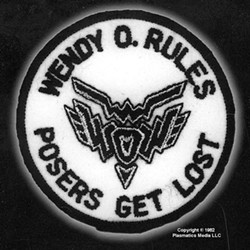
What would you say is the legacy of the Plasmatics?
Let me expand the question since what we are doing here now is generated by Wendy's induction into the Rochester Music Hall of Fame. I'll say Wendy's and the Plasmatics' legacy -- in a way, it's the same thing really because she was it -- she broke down so many barriers, pioneered so many things, and really influenced contemporary culture, although it's not always acknowledged or appreciated how much this was.
Given all of this, it's hard to know where to begin. A lot of it, like the stage shows and videos, is still unmatched today, and I don't think that there will ever be anything actually like it; it's kind of like you had to be there. Things in music, like fusing and breaking down the punk and metal barrier, and Wendy's vocals themselves, which got more extreme and amazing as her career went on. I could go into fashion. Wendy was put on People Magazine's Best Dressed List for her influence on fashion. She originated things that are almost now generic these days. I don't think people understand where they came from, but in those days were remarkably daring.
Beyond all of this, the legacy is the idea that people need to be themselves, need to think for themselves, and fight consensus programming which of course, we see in today's so-called smart devices. It's kind of an ironic name whether they're smart devices or dumbing down devices -- but you know, basically telling people what to buy, where to go, in essence what to think -- this is orders of magnitude worse in a certain way then was back in our day when we saw things coming. Somewhere in there is all part of the legacy. I think it's kind of big, and I think other people need sort it out beyond that.
How do you think Wendy would react to being inducted into the Rochester Music Hall of Fame?
It's a good question. I had to think about it when I was asked to accept on her behalf, and I actually think she would have thought it's a great thing. Her story being what it is, coming from where she came from, setting out to find what I believe she thought she did in fact find, and then being recognized for it in the place where it all began, I think is really a terrific thing.
I think it's not only props to Wendy, but it's also props to the Rochester Music Hall of Fame and the place where Wendy grew up. To me, in a world that's heading fast into such concerning directions, I actually think it's a very hopeful thing. So I think the answer would be a terrific thing.
Is there anything else you would like to add?
Think for yourself, always question, and remember the hope for the world is in outliers.